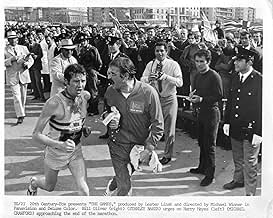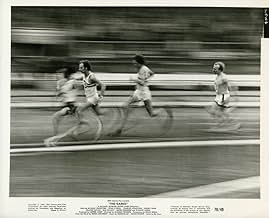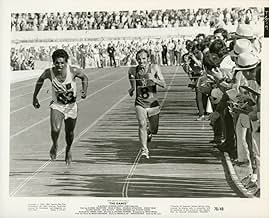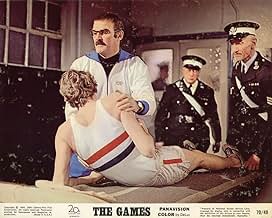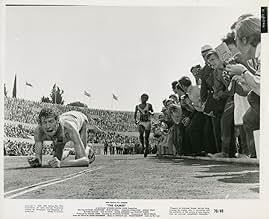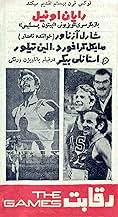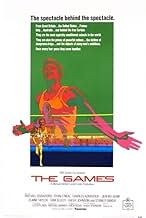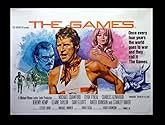Ajouter une intrigue dans votre langueFour marathon runners (one from England, one from the U.S., a Czechoslovakian, and an Australian Aborigine) prepare to run in the Olympic games. The film follows each one and shows what thei... Tout lireFour marathon runners (one from England, one from the U.S., a Czechoslovakian, and an Australian Aborigine) prepare to run in the Olympic games. The film follows each one and shows what their motivations are for running in the games.Four marathon runners (one from England, one from the U.S., a Czechoslovakian, and an Australian Aborigine) prepare to run in the Olympic games. The film follows each one and shows what their motivations are for running in the games.
Avis en vedette
A more apt title might have been "The Marathon" since really this film deals more with that than the actual Olympic Games. In it, four runners, with disparate backgrounds, train and train in preparation for the big day when they will run 26 miles in just over two hours. Crawford plays a gawky and gangly milkman who, even in dress shoes, can outrun members of a local track team. Eventually, he is given a chance to improve himself under the direction of surly, obsessive coach Baker while girlfriend Taylor mopes. O'Neal is a cocky American who often doesn't push himself as far as he is capable of going and who drinks and cavorts regularly, activities which usually are an athlete's no-no. Compton is a simple Aborigine whose talents are being exploited for gambling profit by the thoughtless Kemp. Finally, Aznavour plays the world record holder - The Iron Man - who comes back into the fray to retain his title. To say that the editing is brisk on this film is an understatement. It's positively MTV-ish for the time it was made, though it occasionally verges on the choppy. The acting, for the most part, is fine. Crawford takes a while to seem realistic rather than comic, but eventually gets there. Baker digs deeply into his part and turns in a memorable performance. O'Neal was well cast for his role (and his then-wife Leigh Taylor-Young even pops up unbilled as a girl he wins in a drinking contest!) Compton is no actor, but manages to get by on an innate charm. Kemp has one of his most showy and prominent roles and enjoys himself fully. Aznavour has little to do (and is about the last thing one would expect to see as an Iron Man!), but he does all right. His child in the film has GOT to go down in history as one of the least attractive screen children EVER! There's a lot of great globe-trotting scenery, a nice trip into the world of 1970 and a cast that's peppered with decent British actors (not to mention an early appearance by handsome, baritone-voiced Elliott.) This isn't a spellbinding film, but it's a nice slice-of-life look at the backgrounds of these men and a glimpse into what it takes to attempt a marathon run. Until the big race, the stories rotate constantly, which helps with the pacing (though O'Neal is offscreen for a shockingly long time near the beginning.) Other interesting factors in the film include the politics of the Games and the depiction of racial relations in Australia. Widescreen viewing is recommended.
This movie has aged, of course it's going on for 40 years so that is understandable. Never the less it represents a time gone by, its politically incorrect, full of racially insensitive remarks and highlights the conflict with professionalism/amateurism, drugs and the political grandstanding that went on back in the 60's,70's and 80's in track and field. As an other reviewer says the Olympics was the ideal forum where sport was all about politics.
It's a movie really for track and field enthusiasts although it's interesting to see a very young Michael Crawford (who actually had top billing for this movie) and Ryan O'Neal in his love story glory (it had not been released) and a young Sam Elliot who you would never recognize today but sounds the same. If I hadn't known better I would have said his voice was dubbed, but no it actually was Elliot's voice which would become better known as his career progressed. Crawford never hit the big time in movies but would be better known in comedy and stage by the late 70's and 80's. O'Neal ironically became typecast in his love story role which he never really shook that off all but disappeared from the screen by 1980.
As for the political incorrectness, it starts almost at the beginning. Back in those days milk was the stable drink but nowadays because of the fear of heart disease and bad cholesterol gator aid or some ridiculously priced glucose based drink that is supposed to re-balance the fluids in the body would be the primary beverage, milk just won't cut it! In the second scene while at Yale University Reynolds gets into a "binge drinking" contest. Of course, that's really what it amounts to of but here it's innocently described as a 'Chug-a-lug' contest where the prize is a night with one of the (co-ed or sorority girl?) girl students. Both drinkers pass out and today Women's advocate groups and the college establishment would freak at this type of activity, you certainly can't make light of things like that today.
The aborigine Australian runner Sunny "who is used to the heat" and runs in bear foot learned to run because he chases kangaroos in the bush is also another politically incorrect stereotype that won't cut today either. Also portraying Harry Hayes coach Bill Oliver as a homosexual should not be overlooked. It was meant to be subtle but it didn't fool me at all, the aggression, the drooped moustache, the sexual tension with Hayes girlfriend as well as the jealous looks, it was just all too apparent.
It's obvious that a lot of the film was left on the cutting room floor, probably for time constraints, yet it is still allows for character development. In addition you can see at first hand the cultural differences and training methods each runner uses in the old days of "shamateurism ". I'd have to say that all of the athletes that were portrayed Harry Hayes, Vedick , Sunny Pintubi and Reynolds from the UK, Czechoslovakia, Australia and USA respectively were well cast and very believable as runners.
The climax of the movie is worth waiting for and the gut wrenching Jim Peters moment (Vancouver 1954) portrayed by Harry Hayes is a spectacle. Great commentary from both BBC broadcaster Ron Pickering and former US Olympian Rafer Johnson for NBC, it's well worth a watch for all of the above
It's a movie really for track and field enthusiasts although it's interesting to see a very young Michael Crawford (who actually had top billing for this movie) and Ryan O'Neal in his love story glory (it had not been released) and a young Sam Elliot who you would never recognize today but sounds the same. If I hadn't known better I would have said his voice was dubbed, but no it actually was Elliot's voice which would become better known as his career progressed. Crawford never hit the big time in movies but would be better known in comedy and stage by the late 70's and 80's. O'Neal ironically became typecast in his love story role which he never really shook that off all but disappeared from the screen by 1980.
As for the political incorrectness, it starts almost at the beginning. Back in those days milk was the stable drink but nowadays because of the fear of heart disease and bad cholesterol gator aid or some ridiculously priced glucose based drink that is supposed to re-balance the fluids in the body would be the primary beverage, milk just won't cut it! In the second scene while at Yale University Reynolds gets into a "binge drinking" contest. Of course, that's really what it amounts to of but here it's innocently described as a 'Chug-a-lug' contest where the prize is a night with one of the (co-ed or sorority girl?) girl students. Both drinkers pass out and today Women's advocate groups and the college establishment would freak at this type of activity, you certainly can't make light of things like that today.
The aborigine Australian runner Sunny "who is used to the heat" and runs in bear foot learned to run because he chases kangaroos in the bush is also another politically incorrect stereotype that won't cut today either. Also portraying Harry Hayes coach Bill Oliver as a homosexual should not be overlooked. It was meant to be subtle but it didn't fool me at all, the aggression, the drooped moustache, the sexual tension with Hayes girlfriend as well as the jealous looks, it was just all too apparent.
It's obvious that a lot of the film was left on the cutting room floor, probably for time constraints, yet it is still allows for character development. In addition you can see at first hand the cultural differences and training methods each runner uses in the old days of "shamateurism ". I'd have to say that all of the athletes that were portrayed Harry Hayes, Vedick , Sunny Pintubi and Reynolds from the UK, Czechoslovakia, Australia and USA respectively were well cast and very believable as runners.
The climax of the movie is worth waiting for and the gut wrenching Jim Peters moment (Vancouver 1954) portrayed by Harry Hayes is a spectacle. Great commentary from both BBC broadcaster Ron Pickering and former US Olympian Rafer Johnson for NBC, it's well worth a watch for all of the above
bringing stories together in a movie is an art form and this is an excellent painting, micheal winner where did it all go wrong? crawford, baker and o neal are never better and charles aznavour? i have not seen this film for 20 years but long for the day to see it again does anyone know how?
This is a pretty decent film on one of my favorite subjects, the Olympics. This film pretty much takes its inspration from several real figures in Olympic history (Abebe Bikila, Dorondo Pietri and Emil Zatopek) and uses their stories as the basis of this film. Its just too bad that this film is rarely, if ever, shown on television anymore because it does show what motivates someone to run in the marathon and what it takes to complete it.
Michael Winner made a lot of rather variable films before he found his true vocation as a restaurant critic.This one is prime ham.It is rather difficult to take seriously for one minute.With scrawny Aznavour and Crawford looking like they couldn't go 100 yards. A athletics is not my sport and the same goes for Winner.
Le saviez-vous
- AnecdotesA then-unknown Sir Elton John sang the Francis Lai and Hal Shaper-penned "From Denver to L.A." as part of the film's soundtrack, which was issued in the U.S. by Viking Records (LPS-105). He was so little-known at that point, that he was credited on the label as "Elton Johns". The label planned to issue the song as a single (VIK-1010, backed with "Warm Summer Rain" by The Barbara Moore Singers), and promotional copies were pressed, but John, who first hit stardom towards the end of 1970, had the record withdrawn before commercial copies could be pressed. Upon his reaching superstar status, promotional copies of the "From Denver to L.A." single have become prized collector's items and an interesting curio in John's recorded catalogue.
- GaffesAt once stage during a particularly twisty and narrow part of the race on Rome's streets, the pace vehicle is forced to go so slow that it forces leader Hayes almost to a standstill to avoid colliding with it.
- ConnexionsReferenced in Vsechnopárty: Episode dated 14 April 2017 (2017)
Meilleurs choix
Connectez-vous pour évaluer et surveiller les recommandations personnalisées
- How long is The Games?Propulsé par Alexa
Détails
- Date de sortie
- Pays d’origine
- Langue
- Aussi connu sous le nom de
- Bitmeyen yarış
- Lieux de tournage
- Copenhague, Danemark(kine weekly 16/11/1968)
- société de production
- Consultez plus de crédits d'entreprise sur IMDbPro
- Durée1 heure 40 minutes
- Couleur
- Rapport de forme
- 2.35 : 1
Contribuer à cette page
Suggérer une modification ou ajouter du contenu manquant

